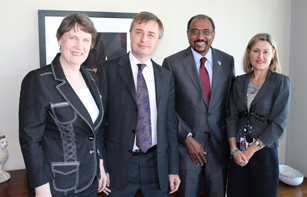
Feature Story
UNDP and UNAIDS Leaders Begin High Level Joint Mission in New Zealand
05 March 2012
05 March 2012 05 March 2012
(From left to right): UNDP Administrator Helen Clark; Chief Executive and Secretary of New Zealand’s Ministry of Foreign Affairs and Trade, John Allen; UNAIDS Executive Director Michel Sidibé; and Amanda Ellis, Deputy Secretary, International Development Group.
Credit: UNAIDS
The Administrator of the United Nations Development Programme (UNDP), Helen Clark, and the Executive Director of the Joint United Nations Programme on HIV/AIDS (UNAIDS), Michel Sidibé, began a three day mission in New Zealand—the first joint mission by the two UN leaders in this Pacific country.
Highlighting the importance of continued vigilance in the AIDS response, Ms Clark and Mr Sidibé emphasized the leadership demonstrated by New Zealand in the HIV response and called on New Zealand to continue to play a strong role to achieve the targets of the 2011 UN Political Declaration on AIDS.
“I commend New Zealand for taking early, decisive action to keep the AIDS epidemic under control,” said Mr Sidibé in an address to staff at New Zealand’s Ministry of Foreign Affairs and Trade. “New Zealand can be the first country in the Pacific region to reach the UNAIDS vision of Zero new HIV infections, Zero discrimination and Zero AIDS-related deaths,” he added.
The world is making progress but we cannot end this epidemic if we keep AIDS in isolation
UNDP Administrator Helen Clark
Speaking at the Beehive Theatrette in the New Zealand Parliament, Ms Clark emphasized the link between HIV and core issues of human development. “The world is making progress but we cannot end this epidemic if we keep AIDS in isolation,” said Ms Clark. “We must help countries to address the underlying drivers, like poverty and gender inequality, that put people at risk for HIV.”
The New Zealand mission includes meetings in Wellington with Prime Minister John Key and other high-level government officials, such as the Minister of Women’s Affairs and the Associate Minister of Health, Honourable Jo Goodhew, Minister of Pacific Island Affairs and Education, Honourable Hekia Perata, and Chief Executive Officer of the Ministry of Foreign Affairs and Trade, John Allen.

UNDP Administrator Helen Clark and UNAIDS Executive Director Michel Sidibé join Tane Waetford, Policy Officer, Asia Regional Division, Ministry of Foreign Affairs and Trade (far left) and Martin Wikaira, Director, Maori Policy Unit, Ministry of Foreign Affairs and Trade (far right) at a Powhiri greeting ceremony in Wellington, New Zealand, on 5 March.
Credit: UNAIDS
While in Auckland, Ms Clark and Mr Sidibé will visit the New Zealand AIDS Foundation, where they will meet representatives of civil society, people living with HIV and other partners involved in the AIDS response. On the occasion of 8 March, International Women’s Day, Ms Clark and Mr Sidibé will open new offices for Positive Women Inc.—a support organisation for women and families living with HIV and AIDS.
New Zealand is recognized for having taken early domestic measures to protect the health and human rights of vulnerable populations. In 1987, New Zealand was among the first countries to introduce needle—syringe programmes for people who use drugs, and in 2003, New Zealand decriminalized sex work. These initiatives were essential to prevent the spread of HIV among key populations. Nationally, HIV prevalence remains low at 0.1% of the population.
New Zealand also provides critical international leadership in the HIV response, with a strong focus on AIDS in the Pacific Island States—particularly in Papua New Guinea, which has the largest epidemic in Oceania.



